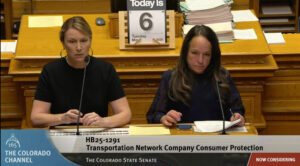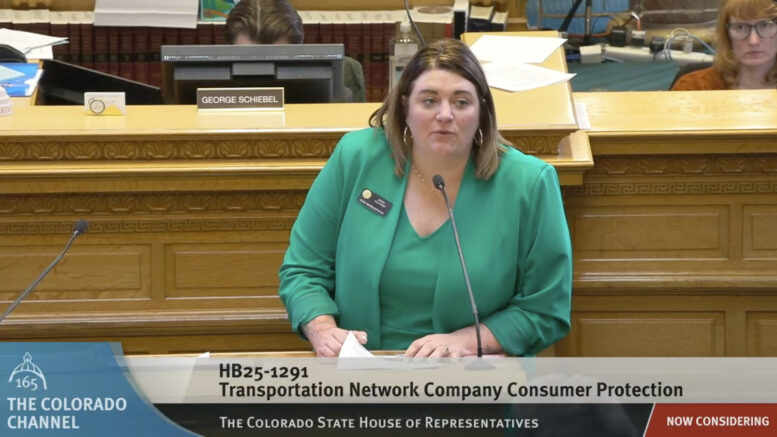Despite a bevy of amendments added by sponsors over the legislative session’s final two days to try to temper opposition, Colorado’s largest rideshare company is still threatening to leave the state if Gov. Jared Polis signs a bill to boost safety regulations on the sector.
House Bill 1291 was one of the most emotional bills of the session, having been sparked by sponsoring Rep. Jenny Willford being sexually assaulted by a Lyft driver last year and then prompting an outpouring of sympathy from women with similar stories. It passed the House on a 59-6 vote when the usually loquacious chamber held back its comments and only ran into trouble in the Senate, as business leaders and Polis questioned the impact it could have on transportation network companies.
By the time HB 1291 passed the upper chamber on the morning of the session’s final day Wednesday, however, it was a very different bill than the one Willford had introduced.
The focus on preventing people from impersonating drivers, as had happened in her case, was largely gone, as was the mandate that Uber, Lyft and other companies record every passenger ride. Now the bill pushes companies to deactivate drivers accused of assault, requires semiannual background checks on drivers and creates a private right of action for riders to sue drivers and TNCs for incidents involving sexual assault, death or injury.
“Would force Uber to shut down operations”
Despite the rash of amendments — 10 passed by sponsors Tuesday and Wednesday, as well as a Republican-originated change to help businesses — neither rideshare company is backing down on its criticism of HB 1291, despite agreeing with its safety premise. Lyft said in a statement that some of the last-minute changes made the bill worse, while Uber stuck to its threat that it would cease operations in the state if required to conform to the most onerous provisions in the proposal.
“We urge Governor Polis to veto HB25-1291, a bill developed behind closed doors and driven by the financial interests of billboard attorneys — not the needs of Coloradans,” the company said in a statement. “If enacted, this legislation would force Uber to shut down operations, stripping thousands of drivers of flexible earning opportunities and cutting off a trusted, reliable transportation option for hundreds of thousands of riders.”
Willford made it clear when she unveiled the bill at a Feb. 28 news conference that she wanted to prevent anyone else from going through what had happened to her — and that she would do it by cracking down on the hiring of drivers with criminal backgrounds. The original bill dictated use of the FBI’s background check system — a provision companies fought because of what they called flaws in that process versus the checks they use — and a requirement to check identity of drivers for each ride and to record contents of the ride.

Colorado state Rep. Jenny Willford explains her bill to boost rideshare safety requirements during a Capitol news conference in February.
What’s behind rideshare companies’ opposition
While Uber and Lyft said they too prioritize safety, they pushed back on the specific means of implementation. They — as well as civil-rights groups like the ACLU — noted Colorado privacy laws limit recording and retention of data without customer opt-in, and they said the private right of action exposed them to liability even if drivers break the TNCs’ rules.
Uber and Lyft leaders offered different ways to get to the same goals, such as charging individuals who impersonate registered drivers with second-degree felonies rather than requiring onerous per-ride verification, but sponsors rejected those ideas. By Wednesday, efforts to stop account-sharing and driver impersonation were gone from the bill, except a provision directing the companies to create policies banning that practice.
In what cosponsoring Sen. Jessie Danielson, D-Wheat Ridge, called the most difficult concession, the bill would allow drivers and riders to opt in to recording the ride but would not mandate the action. It no longer requires TNCs to provide the technology to drivers to enable audio/visual recordings. And it limits lawsuits to reasons of sexual assault, death and injury rather than allowing them in instances where, say, drivers violate policies companies must develop to ban them from sharing food and water with riders.
What the bill still requires of rideshare companies
HB 1291 still requires twice-yearly criminal checks and mandates that drivers report to TNCs within 48 hours any new convictions or incidents that would disqualify them from ferrying customers around. It now requires deactivation of drivers who are subjects of complaints, and it requires companies to allow riders to see reviews of drivers unless they are clearly biased. And it requires the companies to respond with seven business days to law-enforcement agencies seeking information about alleged assaults and other crimes.
Sponsors and supporters said that the “billionaire companies,” as they often were identified, should no longer be able to look away from wrongdoings that happen inside their vehicles and should be held accountable for toughening safety precautions. If not, they can be hit with lawsuits and with fines of as much as $20,000, and they would not be allowed to require customers in cases of sexual assault or driver misconduct to waive their rights to a jury trial in favor of arbitration.

Colorado state Sens. Jessie Danielson and Faith Winter discuss their rideshare safety bill in the Senate on Tuesday.,
“To these companies, I say: We are done making you comfortable. We are done letting you bully and silence survivors,” said Willford, who said the response to her reporting her sexual assault was to get a refund and a promise to never match her with that driver again. “One sexual assault is too many, and your activities speak louder than words.”
But to those companies, the bill, while well intentioned, is riddled with too many legal inconsistencies and untenable regulations for it to achieve its aims.
“Better ways to improve safety in Colorado”
Testifying before legislative committees, company leaders argued that the private right of action and the clause barring arbitration violate the federal arbitration act, seemingly in order to generate more lawsuits for attorneys that supported the bill. They noted too that the provisions requiring speedy deactivation of accused drivers are inconsistent with a TNC regulation bill passed last year that requires companies hear appeals from those drivers and give them a chance to get back onto the platform.
Officials from the ACLU of Colorado told the Senate Business, Labor & Technology Committee on April 22 that the host of misdemeanors that could disqualify potential drivers serve as barriers to employment against justice-involved state residents. And critics noted that even though the bill now says that TNCs aren’t responsible for providing drivers with the equipment to record rides, the PUC could require some investment when it does rulemaking.
“While safety on our platform is paramount, the bill passed in the Senate today fails to address fundamental flaws in the original version and in crucial ways made the legislation worse. Multiple provisions were added last-minute without consideration for the long-term consequences they could impose upon both riders and drivers,” Lyft said in a statement Tuesday. “There are better ways to improve safety in Colorado, and we remain committed to working toward a more productive solution.”
To try to rally opposition to these clauses, Uber displayed a message to riders opening its application in Colorado warning that it would leave Colorado if the bill became law. Willford railed against that tactic in the House Wednesday, saying the company spent more time battling the bill than it did trying to work with her to discuss safety.
Battle over potential veto begins
“Instead of continuing our good-faith negotiations and conversations, they created a false ultimatum, a hostage situation,” Willford said. “I have to wonder if this bill would even have been necessary if the rideshare companies put this level of resources into safety that they have into trying to kill the bill.”
Sponsors also made special pleas to Polis to sign the bill, showing their fear that the Democratic governor will veto it like he vetoed a bill last month that sought to put new regulations on social-media companies to stop criminal activity on their platforms. Polis launched his career as a disruptive technology-industry executive, and he has opposed efforts to burden tech companies with new regulations that he believes could stifle innovation or subject them to rules that no other companies must follow.
“To our governor, who says he wants Colorado to be one of the safest states in the nation … stop being so wedded to a technology company that you use industry talking points against the very survivors who are begging you to see them,” Willford said. “Governor, I beg you, stand with survivors, not just in words but in law. Sign this bill. Actions speak louder than words.”
Polis has until June 6 to sign or veto bills passed this legislative session.
